Announcements of Camps taking place
Experience has been gained with small and large groups as you can read below. No camps are currently scheduled, but the next idea has already being worked out:
PEOPLE & PLANET CAMP
„Traces to the future“
This is one of the key thoughts we will discuss:
„Leaving traces in harmony with the big picture doesn’t have to feel difficult. Lightness and curiosity are allowed to be very close to us and very close to you; just as if you were leaving tracks in the sand with your feet on the beach. And no question remains [transl. from German, emphasis added]“
(Reference Link, page 55).
These books can be used for PEOPLE & PLANET CAMPS in German language; for example SPUREN IN DIE ZUKUNFT during the camps and NAH BEI DIR accompanying before or after the camps.
GERMAN:
> In unserer freien Existenz für Wohl und Würde mit
Kopf, Herz und Hand liegt – bei allen Wirren und in der Stille –
ein verlässlicher Kompass für alle unsere Pfade. <ENGLISH:
> In our free existence for well-being and dignity with
head, heart and hand – in all the confusion and in the silence –
lies a reliable compass for all our paths. <SPANISH:
> En nuestra existencia libre para el bienestar y la dignidad con
la cabeza, el corazón y las manos, en medio de toda confusión y silencio,
hay una brújula confiable para todos nuestros caminos. <Author:
Vry Meind
Camps in the past
_BREMEN | GERMANY_
- February 5-9, 2024, 6-8 p.m. / LOCATION: UNESCO project school in Bremen

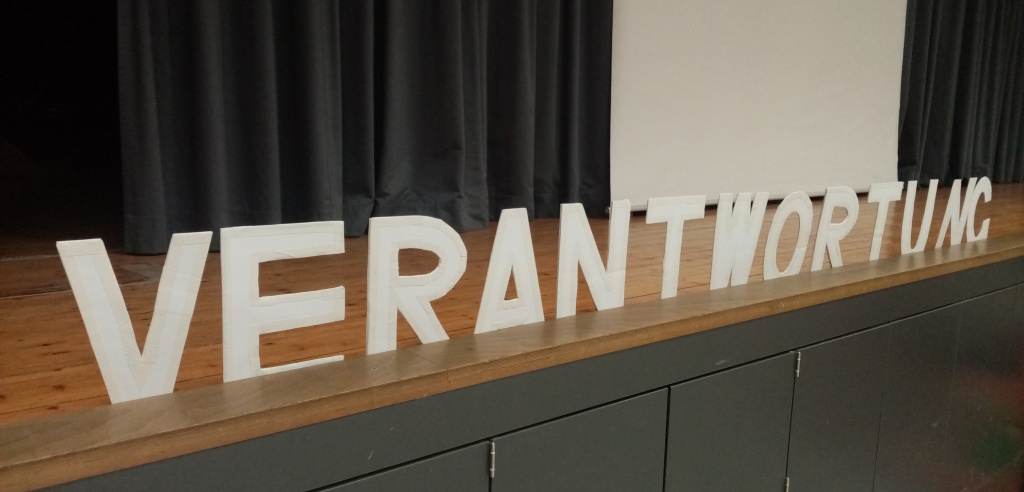
_HAMBURG | GERMANY_
- October 12, 2023, 6-8 p.m. / LOCATION: JUPITER-CAMPUS
- October 26, 2023, 6-8 p.m. / LOCATION: JUPITER-CAMPUS
- November 23, 2023, 6-8 p.m. / LOCATION: JUPITER-CAMPUS
- December 7, 2023, 6-8 p.m. / LOCATION: JUPITER-CAMPUS
- December 21, 2023, 6-8 p.m. / LOCATION: JUPITER-CAMPUS
_TO GET THE ESSENTIAL SLIDES FOR THESE CAMPS KLICK HERE____

Resources
- IMAGE: PEOPLE & PLANET CAMPS
- CONTEXT: #SHAPINGTHEFUTURETOGETHER
- DOCUMENTS: PDF, NARRATIVES, BEST PAPERS AWARD (MIT)
- BLOGS: PEOPLE & PLANET CAMPS 2023, JUPITER-CAMPUS UNIHH
- MAPS: STRENGTH TREASURE MAP, #LearningOcean
- BUTTERFLY: PERSONAL BODY, FEELER & WING TEMPLATE, EXAMPLE
- GAME: ACHIEVING MORE TOGETHER
- ARTIFICIAL INTELLIGENCE: WHAT MAKES A HUMAN BEING A HUMAN BEING
- BOOKS & ARTICLES: ANTHROPOCENE, CHARISMA, PERSONAL EVOLVEMENT IN THE COMMUNITY
- VIDEO CAMPUS INNOVATION & 17 ZIELE FASHION CAMPAGNE:
Camp Design Context
Everything is connected to everything else in a manifold and sometimes quite subtle way (Capra 2012; Briggs & Peat 1999). On our way into the Anthropocene (Crutzen 2002),
events, experiences, emotions, explorings, & engagement (#5e)
become effective in incredibly diverse ways; whereby these can be characterized in English and in German
Ereignisse, Erlebnisse, Emotionen, Einsichten/Erkundungen, & Engagement (#5E)
by 5e respectively 5E (Deckert 2021). In the context of today’s and tomorrow’s challenges, all of us as human beings are once again encouraged to „personal evolvement in the community“ (Leal Filho et al. 2022, p. 2) or in the German original „Persönliche Entfaltung in Gemeinschaft“ (Deckert 2021, p. 32 ff.): Each and every one of us is particularly good at something and can commit and engage to a better world of tomorrow. The challenges ahead are relevant for each and every one of us and we can face them together. Our engagement can be allowed to unfold as freely as possible. In the end, the following strength thesis cannot be proven, but at the same time it remains uncontradicted to this day:
”Society becomes more sustainable to the extent that people are able to become aware of their individual strength and use them for social change in the direction of a more sustainable future.”
Ronald Deckert & Maren Metz;
translated from German language (Deckert 2020, p. 1)
To support the realization of this narrative, spaces and places are helpful where people can freely exchange and develop. The idea for these spaces and places shall be titled here:
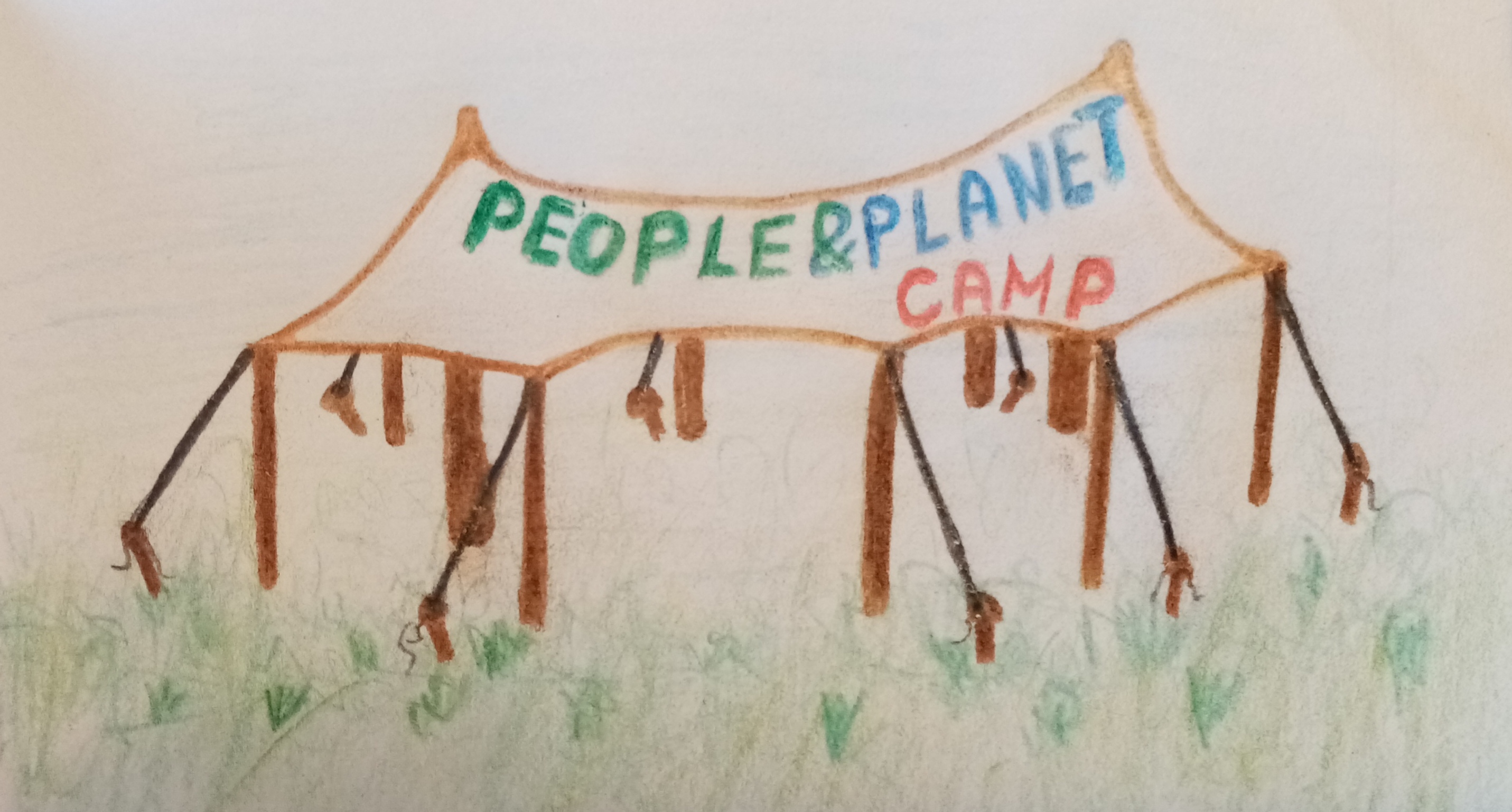
Connected with thoughts around a VUCA world, complexity, social systems, chaos theory, open-creative systems as well as ambiguous contexts, paradoxes, unpredictability and change processes – here especially referring to Luhmann (1968), Brigss & Peat (1999), Capra (2012), de Wit & Meyer (2014), Scharmer (2018), and Rosa (2021) – PEOPLE & PLANET CAMPS shall be understood here as far-reaching freely designable; indoor/outdoor/online, from one hour up to several months duration as well as from fixed to freely variable groups. Pre-structured camps, for example with introducing speeches, are also conceivable, as are camps as free-flowing networking meetings; the latter following e. g. thoughts of Briggs & Peat (2012, p. 75) „no leader, no agreed project, no set topics for discussion“.
Related to learning as deeply anchored in social contexts (Meltzoff et al. 2009) a spectrum of theories and methodologies should be connectable to the camps; related to behaviorism, cognitivism, constructivism and connectivism (Campbell & Schwier 2014; Siemens 2006), lifelong and life-wide learning (Campbell & Schwier 2014) and far-reaching to non-conventional learning on sustainable development like experience-based learning or indigenous knowledge based learning (Leal Filho 2021).
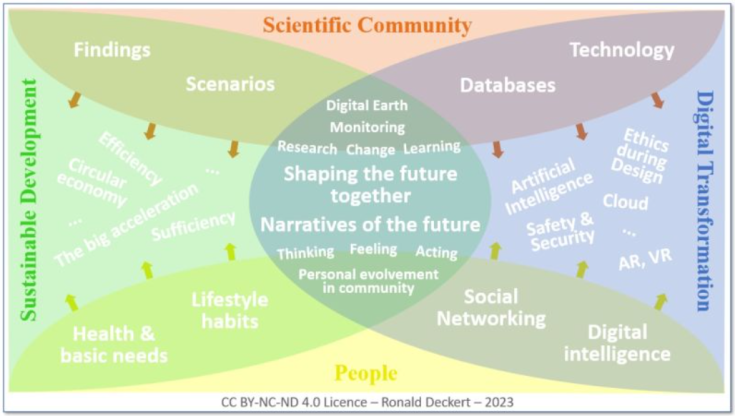
#shapingourfuturetogether #narrativesofourfuture #shapingthefuturetogether #narrativesofthefuture
Two of the orienting thoughts for PEOPLE & PLANET CAMPS can be that thinking, feeling and acting should be combined in and out of the camps as well as change, learning and research (see the figure above). Participation and involvement in PEOPLE & PLANET CAMPS should not require any prior knowledge, but certainly requires a certain interest in a sustainable future in safety, well-being and dignity. Depending on the needs of the group and the situation, topics such as these may help:
- Anthropocene (Crutzen 2002, Deckert 2021;2023), personal strengths,
- Live healthy on a healthy earth (WBGU 2023), environment & health (SRU 2023),
- Blue Zones (Büttner & Skemp 2016), healthy aging/happy living/purpose,
- Creativity & chaos as well as science based on mathematical filters (Briggs & Peat 1999),
- Future scenarios related to digitalisation and sustainability (WBGU 2019), Earth4All/Club of Rome (Dixson-Declève, Espen Stoknes, Randers & Rockström 2022)
- State security (Stahlhut & Lammert 2022),
- Open innovation, Earth4All, Project Labs, …, and/or
- Resilience (Deckert 2023).
The following LEARNING OCEAN provides an initial overview for getting started around resilience.
#LearningOcean
”To fully know oneself would require, in effect,
John Briggs & F. David Peat
understanding the whole universe.”
Literature
Briggs, J., Peat F. D. (1999). Seven Life Lessons of Chaos – Spiritual Wisdom from the Science of Chaos. New York: Harper Perrenials.
Büttner, D., Skemp, S. (2016): Blue Zones: Lessons from the World‘s Longest Lived. American Journal of Lifestyle Medicine. https://doi.org/10.1177/1559827616637066
Campbell, K., Schwier, R. A. (2014). Major Movements in Instructional Design. In: O. Zawacki-Richter, T. Anderson (Hrsg.), Online Distance Education (S. 345-380), Athabasca University: AU Press. https://www.aupress.ca/app/uploads/120233_99Z_Zawacki-Richter_Anderson_2014-Online_Distance_Education.pdf
Capra, F. (2012). Das Tao der Physik – Die Konvergenz von westlicher Wissenschaft und östlicher Philosophie. Neuausgabe nach 1975/1983. München: O. W. Barth.
Crutzen, P. (2002). Geology of mankind. Nature 415, 23. https://www.nature.com/articles/415023a
Deckert, R. (2023). LEARNING OCEAN „Resilience (Nature, Society, People)“ (5th edition). https://doi.org/10.13140/RG.2.2.14295.75689
Deckert, R. (2021). Auf dem Weg ins Anthropozän – Zuversichtlich nachhaltige Entwicklung gestalten. Wiesbaden: Springer.
Deckert, R. (2020). Digitalisierung und nachhaltige Entwicklung – Vernetzt Denken, Fühlen und Handeln für unsere Zukunft. 2nd edition. Wiesbaden: Springer.
De Wit, B., Meyer, R. (2014). Strategy Synthesis – An international Perspective. Boston: Cengage.
Dixson-Declève, S., Espen Stoknes, P., Randers, J., Rockström, J. (2022). EARTH FOR ALL – Ein Survivalguide für unseren Planeten. Der neue Bericht an den Club of Rome, 50 Jahre nach »Die Grenzen des Wachstums«. Club of Rome (Hrsg.). München: oekom.
Leal Filho, W., Levesque, V., Sivapalan, S., Lange Salvia, A., Fritzen, B., Deckert, R., Kozlova, V., LeVasseur, T. J., Emblen-Perry, K., Azeiteiro, U. M., Paço, A., Borsari, B., & Shiel, C. (2022). Social values and sustainable development: community experiences. Environ Sci Eur 34, 67 (2022). https://doi.org/10.1186/s12302-022-00641-z
Leal Filho, W. (2021). Non-conventional learning on sustainable development: achieving the SDGs. Environ Sci Eur 33, 97. https://doi.org/10.1186/s12302-021-00525-8
Luhmann, N. (1968). Zweckbegriff und Systemrationalität – Über die Funktionen von Zwecken in sozialen Systemen. Tübingen: J.C.B. Mohr (Paul Siebeck).
Meltzoff, A. N., Kuhl, P. K., Movellan, J., Sejnowski, T. J. (2009). Foundations of a New Science of Learning. Science. 2009 July 17, 325(5938): 284-288.
Rosa, H. (2021). Unverfügbarkeit. Wien: Suhrkamp.
Scharmer, O. (2018). The Essentials of Theory U – Core Principles and Applications. Oakland: Berrett-Koehler.
Siemens, G. (2006). Connectivism: A Learning Theory for the Digital Age. The Distance. 15 (1). p. 1, 14-18. https://www.academia.edu/2856996/The_Distance
SRU – Sachverständigenrat für Umweltfragen (2023). Umwelt und Gesundheit konsequent zusammendenken. Sondergutachten. https://www.umweltrat.de/SharedDocs/Downloads/DE/02_Sondergutachten/2020_2024/2023_06_SG_Umwelt_und_Gesundheit_zusammendenken.html
Stahlhut, B., Lammert, M. (Hrsg., 2022). Gesamtstaatliche Sicherheitsvorsorge – gerüstet für den Ernstfall!? Berlin: Berliner Wissenschaftsverlag.
WBGU – Wissenschaftlicher Beirat der Bundesregierung Globale Umweltveränderungen. (2023). Gesund leben auf einer gesunden Erde. Hauptgutachten. WBGU. https://www.wbgu.de/de/publikationen/publikation/gesundleben
WBGU – Wissenschaftlicher Beirat der Bundesregierung Globale Umweltveränderungen. (2019). Unsere gemeinsame digitale Zukunft. Hauptgutachten. WBGU. https://www.wbgu.de/fileadmin/user_upload/wbgu/publikationen/hauptgutachten/hg2019/pdf/wbgu_hg2019.pdf
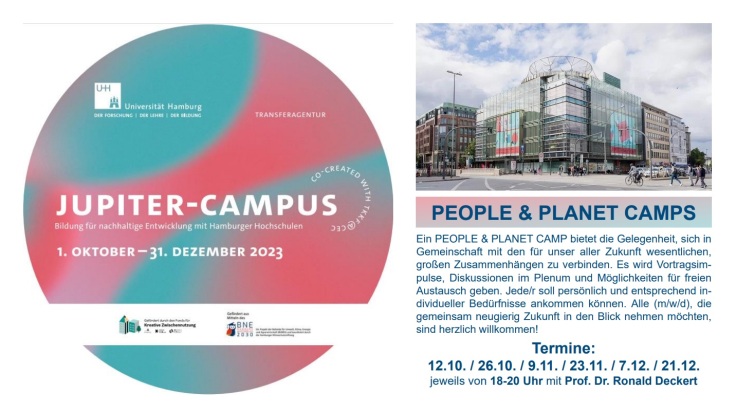






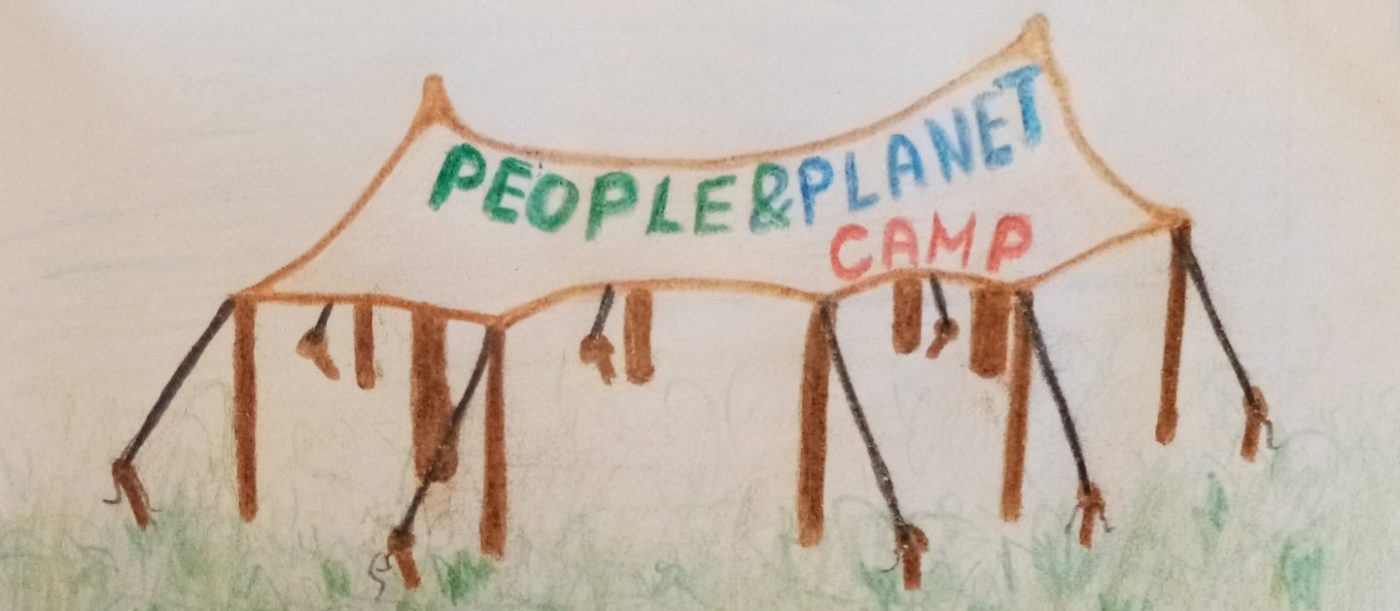
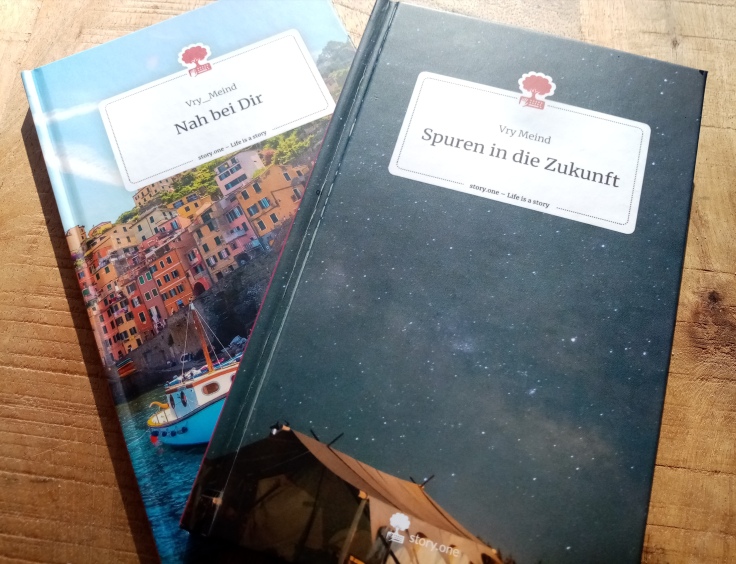
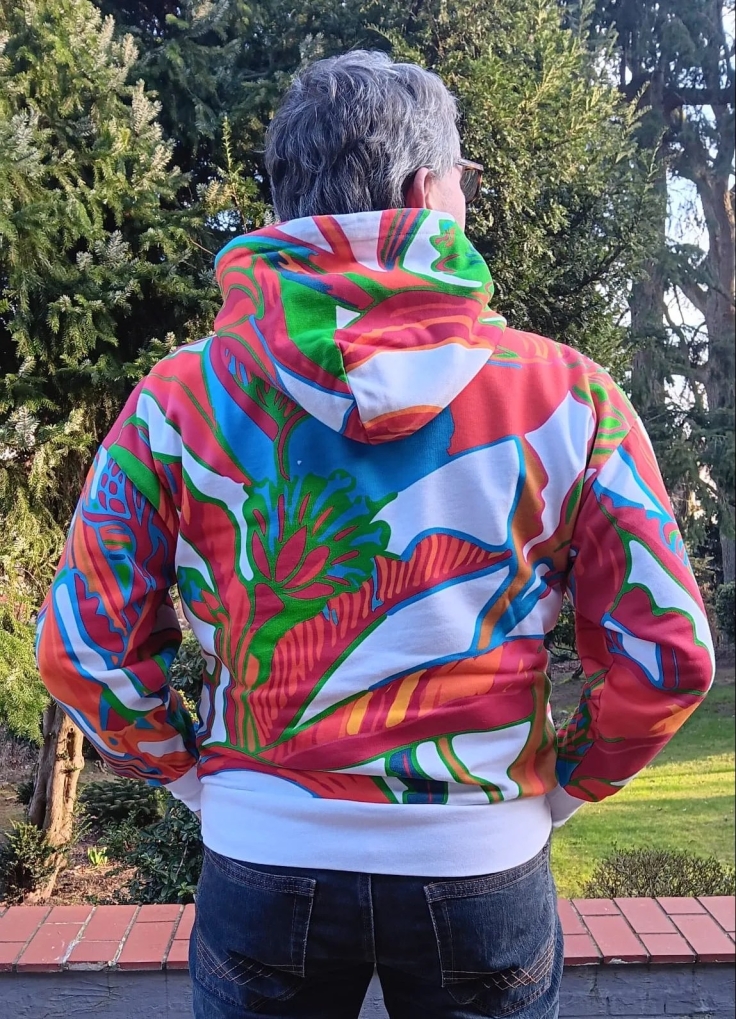







Du muss angemeldet sein, um einen Kommentar zu veröffentlichen.